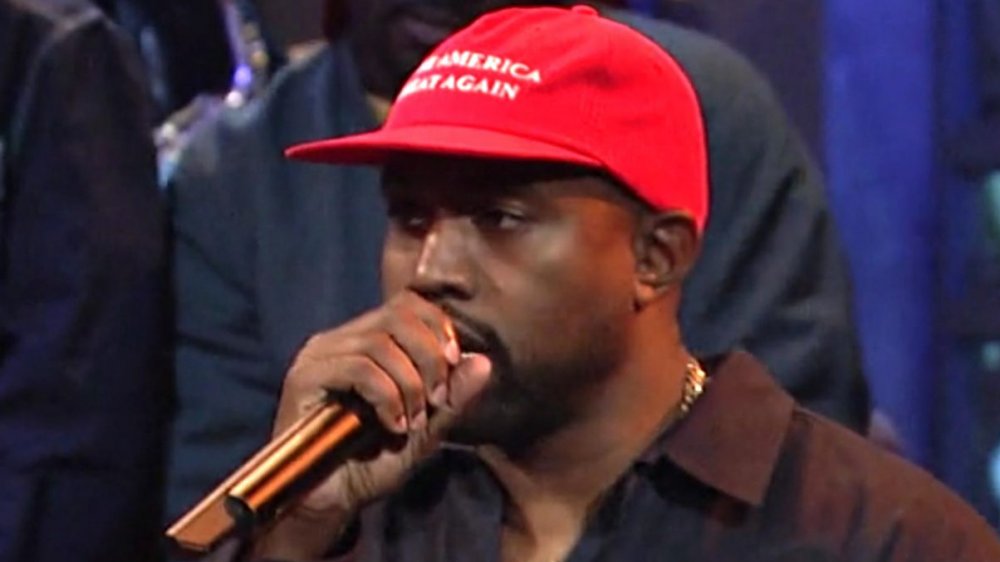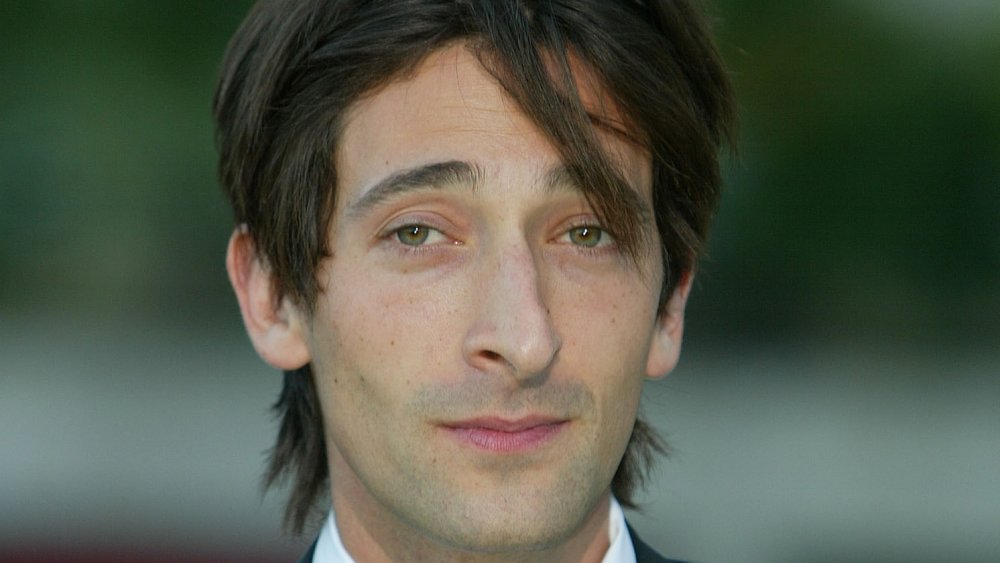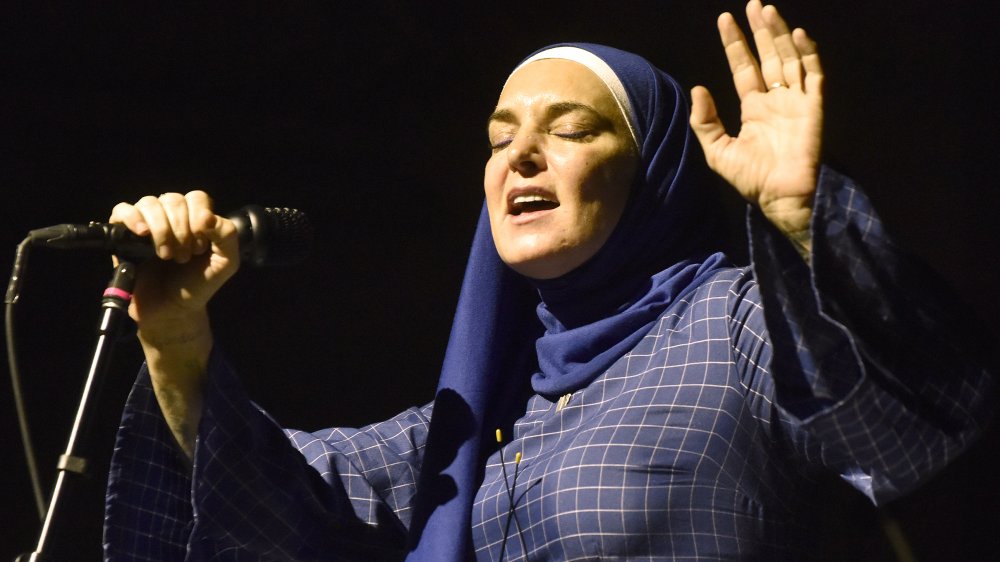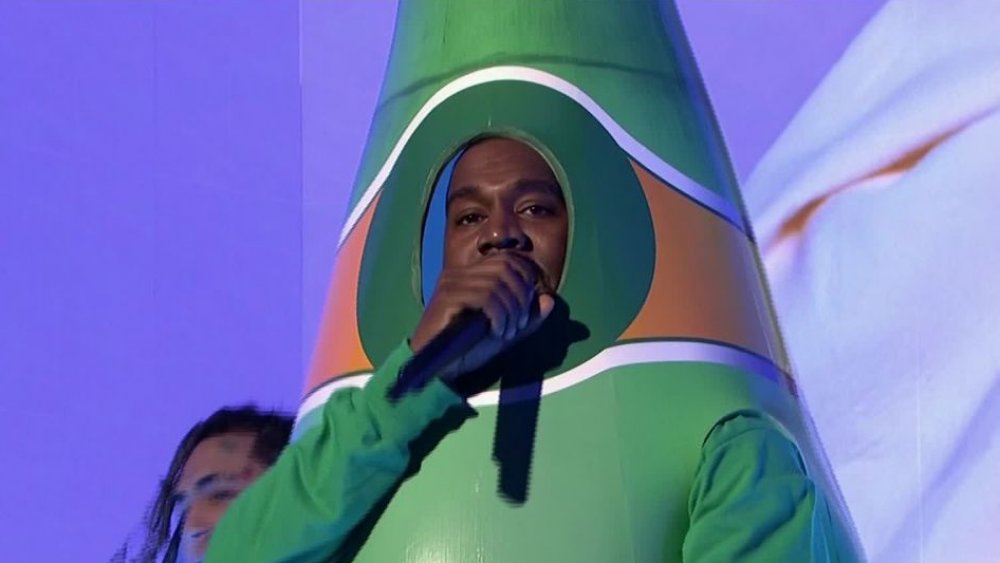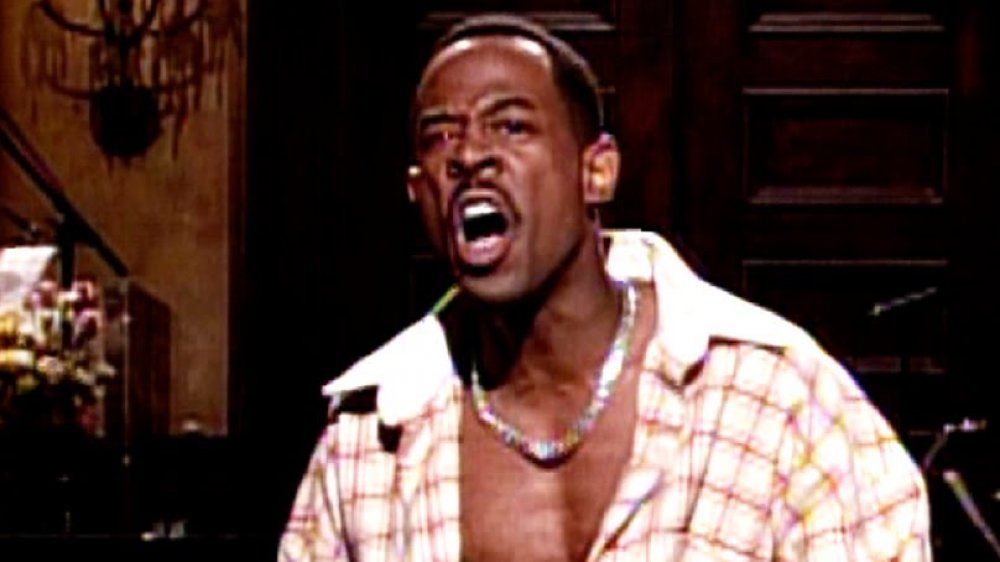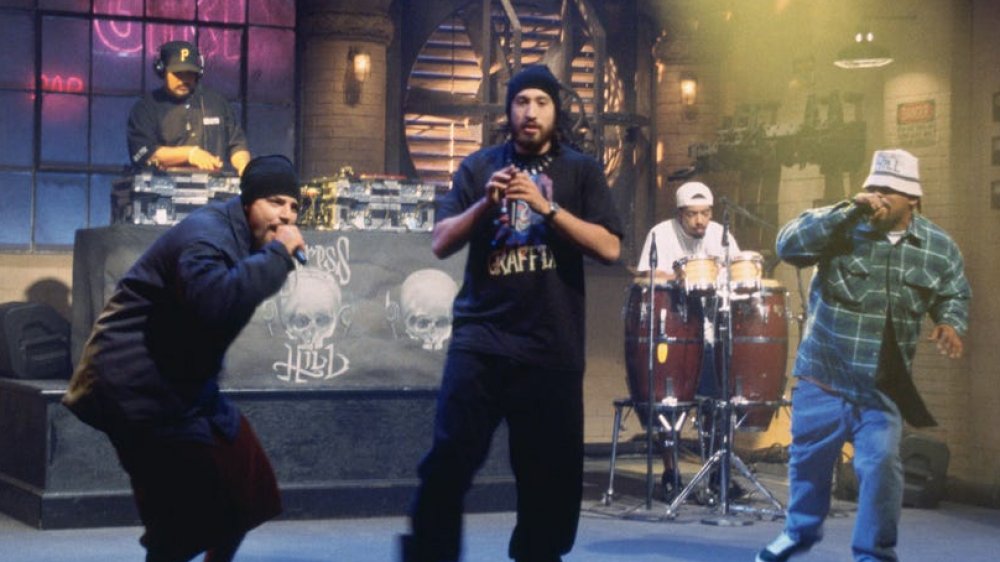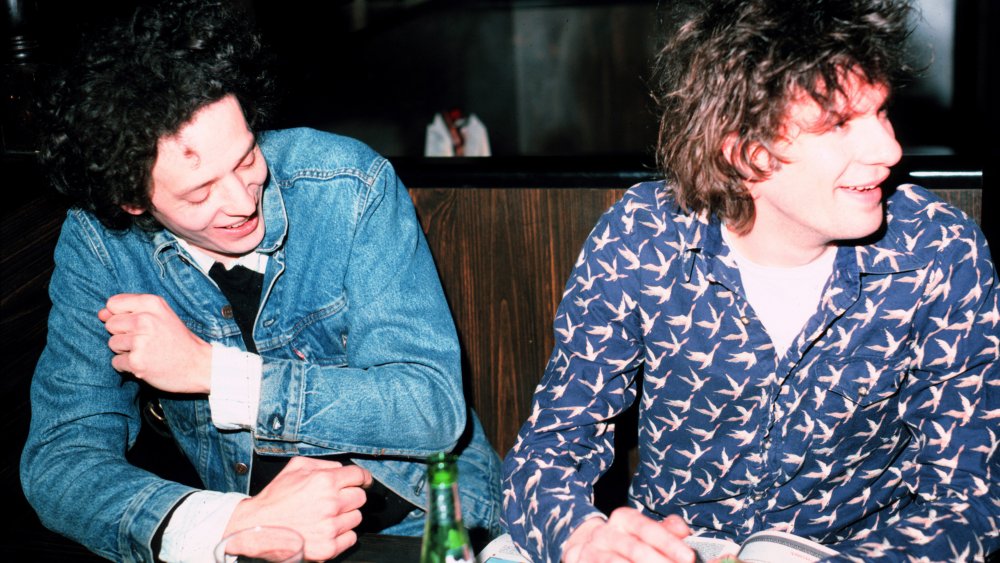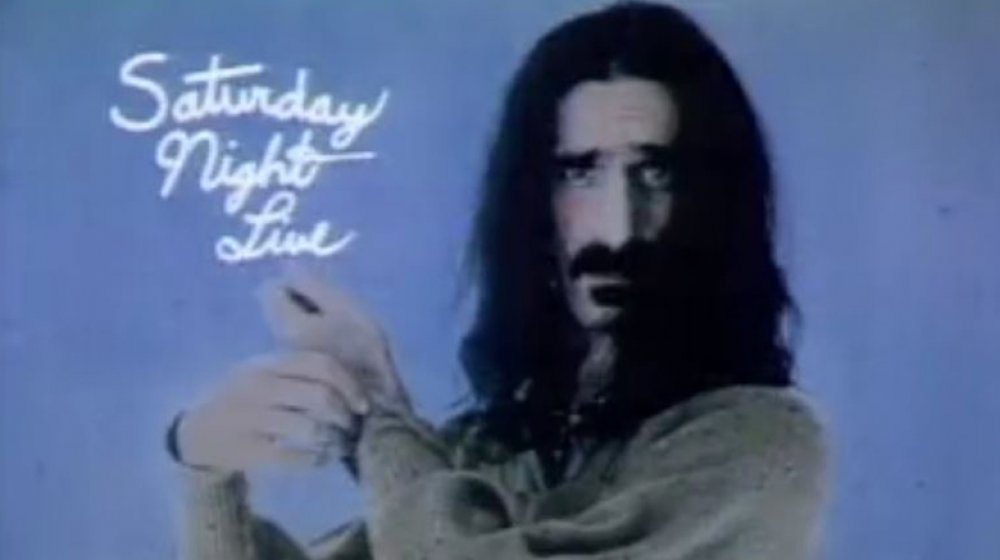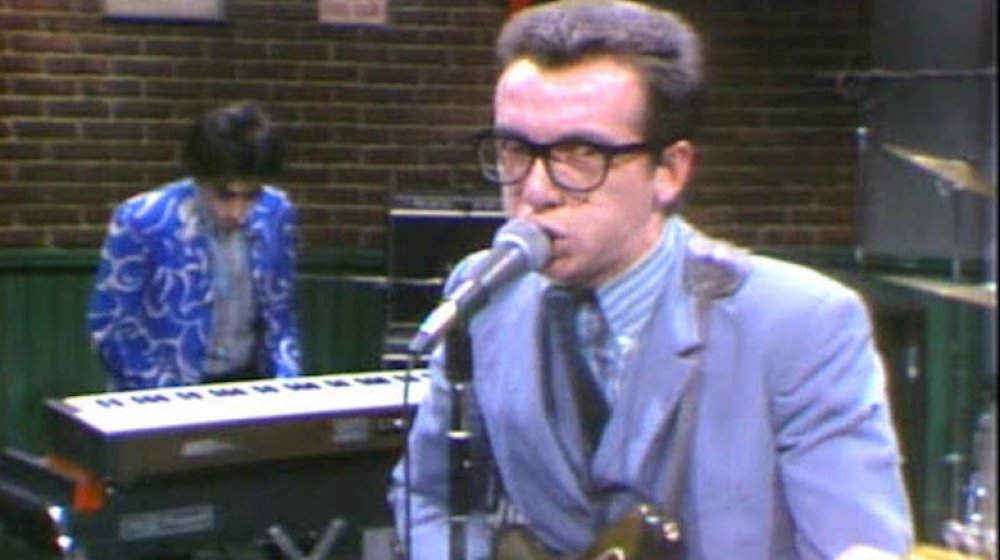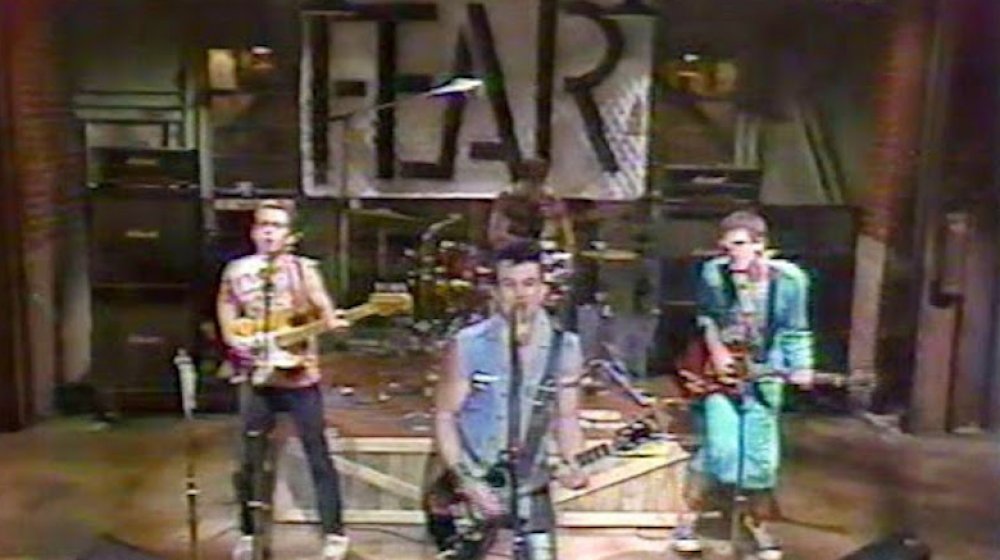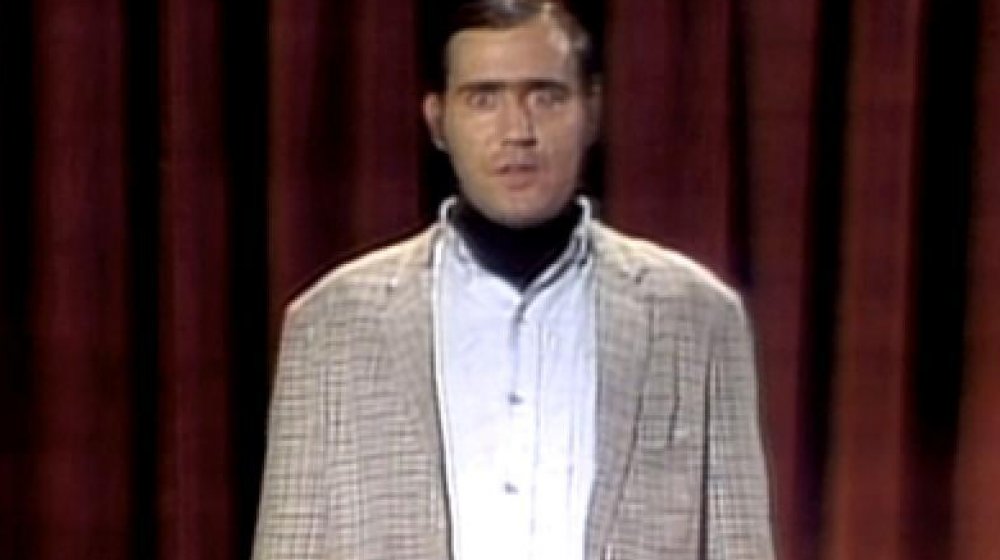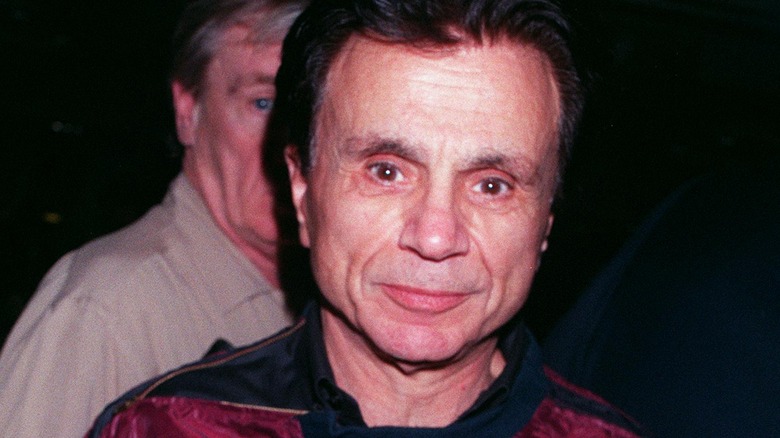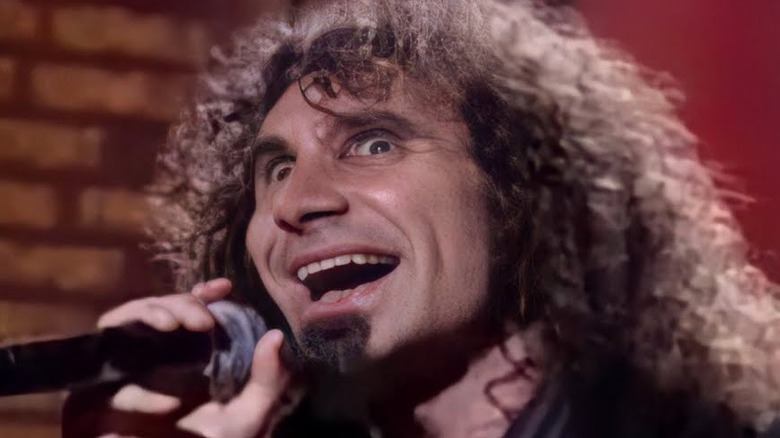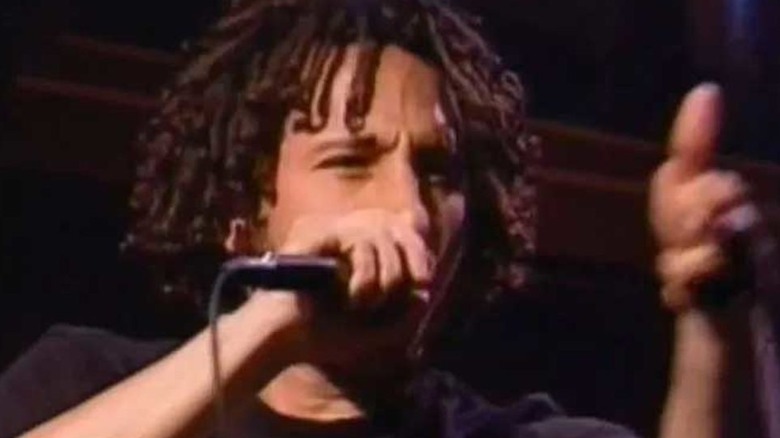Celebs Who've Been Banned From SNL
Saturday Night Live is a television institution, virtually unchallenged in its dominance of late-night weekend television since its 1975 debut. Success on the show nearly guarantees future stardom for cast members, while a guest appearance can act as a milestone moment for actors, comedians, musicians, and various other public figures. SNL produces only about 20 episodes a year, so whoever is selected to be the guest host or musical performer in those precious few installments has either made it big already, or is trembling on the cusp of mega-fame. It's kind of a shame, then, when celebrities get this precious opportunity presented to them ... only for it to blow up in their face.
While hundreds of talented repertory players, sparkling hosts, rocking bands, and unforgettable singers have graced the SNL stage at Rockefeller Center, a few have managed to ensure they're never asked back. These are the major celebrities who have been banned from SNL.
Adrien Brody offended viewers and wasted screen time
After starring as Polish-Jewish musician Wladyslaw Szpilman in the harrowing 2002 drama The Pianist, Adrien Brody rocketed to fame. At the 2003 Academy Awards, he beat out luminaries such as Michael Caine, Daniel Day-Lewis, and Jack Nicholson for the Best Actor Oscar, then aggressively kissed surprised presenter Halle Berry on stage. His newfound celebrity status was confirmed when he got to host a May 2003 episode of Saturday Night Live.
One of the host's duties is to politely introduce the evening's musical guest, which in Brody's case was Jamaican singer Sean Paul. Brody took it upon himself to grab a dreadlock wig and ramble in a problematic, affected Jamaican patois for nearly a minute before throwing it back to Paul. Brody can't come back to SNL now — but not so much for his reggae-inspired antics. The bigger problem was that he improvised, and thus wasted time on the intricately planned live television series. As for the ban, Brody told the Huffington Post he's "heard that," but claims he isn't sure he's been officially barred from SNL.
Sinead O'Connor really ripped it up on SNL
In 1990, Sinead O'Connor was at the peak of fame and success following the release of her single, "Nothing Compares 2 U." O'Connor nevertheless boycotted an SNL appearance when the show booked controversial comedian Andrew Dice Clay to host. O'Connor finally performed on SNL in October 1992, delivering a haunting and riveting a cappella take on Bob Marley's "War." At the end of the song, O'Connor provided what's likely the most infamous moment in Saturday Night Live history: She lambasted Pope John Paul II, and thus the whole of the Catholic Church and its millions of adherents, by holding up a picture of the pontiff, ripping it up, and stating, "Fight the real enemy."
SNL director Dave Wilson made sure the "applause" sign stayed dark and the show cut to commercial amidst stony quiet. Meanwhile, chaos ensued in the studio. While operators fielded calls from numerous angry viewers, an audience member tried to assault O'Connor and had to be removed by security. Unsurprisingly, O'Connor never played SNL again.
Kanye West didn't love his SNL ban
The man they call Yeezy has appeared as the musical guest on Saturday Night Live seven times, and always turned in a performance as inspired as his critically-acclaimed and bestselling albums. Not content to just stand on a stage and rap, West brings his own bespoke sets, light shows, special effects, and even costumes – when he and Lil Pump performed "I Love It" on a September 2018 episode, they did so in gigantic, silly, movement-impairing water bottle costumes. West is held in such high regard that SNL producers allowed him a rare third performance segment in that particular episode.
Rather than merely play a song, however, West delivered an off-the-cuff speech in praise of President Donald Trump while wearing one of the politician's signature "Make America Great Again" hats. NBC cut the speech short for viewers – SNL's 90-minute time-slot ran out — but West continued to walk around the stage and wax political, claiming to be bullied backstage for the MAGA cap, criticizing the mainstream media, and dismissing allegations of racism levied at Trump. All this prompted boos from the studio audience and led host Adam Driver and cast member Chris Redd to walk off. Not long after, West claimed on Twitter that SNL producer Lorne Michaels had asked him to return to "host before the year is out." But according to RadarOnline, West's antics led to quite the opposite — a ban from the late-night series.
Martin Lawrence gave a filthy monologue about hygiene
Martin Lawrence was one of the most famous and popular stand-up comedians of the early '90s. Not only was he host of HBO's Def Comedy Jam, he also co-created and played multiple roles on Fox's smash hit sitcom, Martin. During the show's second season and the peak of Martin-mania, Lawrence was invited to host Saturday Night Live in February 1994. As is customary for stand-up comics hosting the program, Lawrence's show-opening monologue consisted of a comedy routine — which proved just as edgy, profane, and eyebrow-raising as one from Lawrence's successful stage act. The comedian went on a run about his first-hand experiences with feminine hygiene — or the lack thereof. When the episode aired later that night for west coast viewers, NBC cut that portion of the monologue and replaced it with a chyron, explaining the gist of Lawrence's "commentary" and how "network policy prevents" any rebroadcast of that routine.
The episode went on as scheduled, but afterward, network executives banned Lawrence — and not just from appearing on SNL ever again, but from the entirety of NBC. He returned to the Peacock with a 1995 appearance on The Tonight Show, but he's still never been back to Saturday Night Live.
Cypress Hill's joint got them tossed from the joint
Hip-hop collective Cypress Hill is known primarily for two things — its super-catchy and hypnotic 1993 hit "Insane in the Brain," and for unabashedly and openly loving marijuana, well before its sale and use was legalized in numerous states. Performing the former while embracing the latter is what led to some trouble for the group. SNL personnel gave Cypress Hill a dressing room, and expressly told them not to smoke marijuana inside. Member DJ Muggs "felt like he needed to make a statement with his performance," bandmate Sen Dog told the Village Voice. That statement? Smoking marijuana on live TV, in the far more conservative age of 1993.
As Sen Dog recalled, "It wasn't just the Saturday Night Live people saying he couldn't smoke up on air. It was everyone: our record label, our management, our friends." Muggs asked Sen Dog to light the joint, but he refused, and so Muggs did it himself. The rapper said that people associated with SNL told Cypress Hill at the episode's after-party that they thought what they did was "so cool," but higher-ups didn't agree. "The hammer swung and we were banned from Saturday Night Live forever."
The Replacements were too drunk to behave
Fuzzy, melodic, somewhat punk Minnesota rock band The Replacements released their first major label album, Tim, in late 1985. They subsequently made their national television debut on the January 18, 1986 episode of Saturday Night Live. The Replacements notoriously loved to get good and drunk before most of their shows, a ritual that continued in their SNL episode. According to Bob Mehr's Trouble Boys: The True Story of the Replacements, the band got around a "dry set" rule by having their sound guy sneak in booze after a pre-show soundcheck.
By the time the band took the stage just after midnight to play "Bastards of Young," the musicians were thoroughly hammered, and it showed on TV. Singer Paul Westerberg wandered away from his microphone mid-verse, while bassist Tommy Stinson stumbled around so much that cameras barely captured him. Then, fearing Bob Stinson would come in too late on his guitar solo, Westerberg screamed, "Come on, f***er!" to cue him, which his mic caught and censors missed. The only thing missing from this mess was nudity ... until the end of the performance, when it became clear that Bob Stinson was unaware the rear-end of his pants had torn out after a spontaneous somersault. All of that, plus some booze-fueled hotel room destruction, for which the bill went to SNL, earned The Replacements a ban from SNL. However, Westerberg returned as a solo musical guest in 1993. That appearance went down without incident.
Frank Zappa mocked the show from the inside
Genre-bending musical iconoclast Frank Zappa never took himself too seriously, often infusing his music with humor. Accordingly, he seemed like a good bet for Saturday Night Live, and the show hired him to do double-duty as both host and musical guest for an episode in October 1978. Instead of a chill good time, however, this installment became, according to SNL writer and performer Don Novello, "one of the worst ever."
Novello recalled that the episode's final dress rehearsal before live broadcast went horribly, which unnerved Zappa. "We had a terrible dress and what was he going to do? What he did, not telling anybody, was he turned into Dean Martin." That meant Zappa became self-aware, or at least tried to express to the TV viewing audience the irony and artifice of scripted television. "He read the [cue] cards like he was reading the cards — he made a point of it," Novello said. "That was his approach to the humor. No one else in the sketches knew it." Michaels didn't care for Zappa's unauthorized arch take on the material, and so he permanently prevented the rock star from ever returning to SNL.
Radio, Radio got Elvis Costello banned from TV, TV
Early SNL fancied itself an edgy, youthful show, and so its December 1977 episode featured punk-adjacent New Waver Elvis Costello as the musical guest. In his first slot, he played "Watching the Detectives." In his second slot, Costello got just a few seconds into "Less Than Zero," then changed his mind. He waved his arms to signal his band, the Attractions, to stop playing, then announced, "I'm sorry, ladies and gentlemen, there's no reason to do this song here." Costello then played "Radio, Radio" in its entirety. Not only is that song viciously critical of mass media, but Costello had been told by Lorne Michaels to specifically not play it. He did anyway, and so he got banned from the show.
Michaels apparently had a change of heart, because he allowed Costello to come back to SNL in March 1989 to perform a couple of songs off of his album Spike. It all came full circle a decade later, when Costello made fun of himself and the incident that led to his ban. On the SNL 25th anniversary show, the Beastie Boys played "Sabotage" for a few bars, until Costello stormed out on stage, grabbed a microphone, and said, "I'm sorry, ladies and gentlemen, but there's just really no reason to do this song here tonight." Then, he and the Boys launched into a rollicking version of "Radio, Radio."
The punk band Fear destroyed the place
By 1981, John Belushi, SNL's biggest breakout star at the time, had left the show for a movie career. He'd already starred in the mega-hit Animal House and had agreed to star in the dark comedy Neighbors. Around that time, according to Rolling Stone, he got really into a loud, angry, and chaotic punk band called Fear, and befriended lead singer Lee Ving to the point where they recorded a song for Neighbors together. Producers, who didn't want a hardcore punk song on the soundtrack of their mainstream movie, rejected it, so Belushi made it up to Fear by convincing SNL head producer Dick Ebersol to book the band as the musical guest for the Halloween 1981 episode.
Fear brought volumes of authentic punk energy to the network variety series — but this wasn't completely a good thing. According to the SNL oral history Live from New York, Fear's act included film footage of bleeding jack-o'-lanterns and a bunch of violent slam-dancers, who were shown "banging off each other, banging into the audience, banging into cameramen," none of which was "really foreseen," Ebersol said. The show actually cut off the live feed of Fear, who kept playing and tearing up the stage in the studio while viewers saw a pre-taped Eddie Murphy sketch. The band left about $2,500 worth of damage in its wake and Fear earned a permanent ban from SNL.
SNL viewers voted Andy Kaufman off the show
Sometime in the 1980s, Saturday Night Live established a show format that it almost never strays from: comedy sketches, a monologue, "Weekend Update," and two musical performances. In its early days, however, it was much more of a variety show. For example, the first episode, from October 1975, had two musical guests, three stand-up routines from George Carlin, a Muppets segment, and a performance by the difficult-to-categorize Andy Kaufman, who did one of his signature bits: Playing an old record of the "Mighty Mouse" theme and lip-syncing only to the "here I come to save the day" part.
The exposure helped to make Kaufman a sensation and find a larger audience for his alt-comedy and anti-comedy bits, like wrestling women, playing the bongos, appearing as obnoxious lounge singer Tony Clifton, and earnestly impersonating Elvis Presley. He did a lot of those things and more on SNL, appearing on the show 10 times in the late '70s and early '80s. In what could be his most audacious bit, he had SNL producer Dick Ebersol read a statement on air in 1982 explaining that Kaufman's scheduled appearance had been canceled because "Andy Kaufman is not funny anymore." The viewers were offered the chance to decide his fate, voting on whether or not to ban Kaufman from SNL forever by calling telephone hotlines. "Ban Andy" won out, and Kaufman stopped performing on the show. The self-imposed kiss-off was never lifted, and Kaufman died in 1984.
Robert Blake's one and only hosting gig
A long-ago child star of "The Little Rascals" who grew up to be a tough-guy actor and star in the gritty 1970s detective series "Baretta," Robert Blake accepted the call to host "Saturday Night Live" in 1982. He didn't have any big projects coming out at the time, and the idea of getting Blake to host opened up the possibility of having a real Little Rascal act opposite a pretend one, as Eddie Murphy's bizarre impression of Buckwheat had become a smash hit on "SNL" in the early 1980s.
Indeed, a "Little Rascals Reunion" sketch aired as part of the November 1982 episode. Over the course of the show, Blake would only star in that one sequence; that dearth of airtime was a possible consequence of his behind-the-scenes behavior at "Saturday Night Live" that week. "My vote for worst host is Robert Blake," show writer David Sheffield was quoted saying in the 2002 book, "Live from New York: The Complete, Uncensored History of 'Saturday Night Live.'"
Writer and cast member Gary Kroeger pitched Blake a sketch called "Breezy Philosopher," about a biker who waxes poetically about the meaning of life. Blake read the script, and then balled it up and threw it in Kroeger's face. "I hope you got a tough a**hole pal, 'cause you're going to have to wipe your a** with that one," Blake reportedly told the writer. That one limited hosting gig would mark Blake's one and only SNL appearance.
System of a Down dropped the F-bomb
NBC is a free, over-the-air, broadcast network subject to the rules of content restrictions imposed by the Federal Communications Commission. A live TV show like SNL carries with it the risk that someone might say a curse word, bringing criticism and fines to the network. In 2005, SNL invited the metal band, System of a Down, to be its musical guest on an episode hosted by Johnny Knoxville.
During the group's performance of its hit "BYOB," singer Serj Tankian uttered the song's chorus in full several times, singing the lyric "Where the f*** are you?" NBC's censor was quick with the mute button, successfully cutting to silence each time Tankian dropped an F-bomb. But then System of a Down guitarist Daron Malakian stepped up to the mic, and caught up in the moment, yelled out an impromptu "F*** yeah!"
According to Entertainment Weekly, NBC didn't receive any messages from upset SNL viewers in the days following the broadcast, however, it did release a statement acknowledging the profanity, pointing the finger at System of a Down and its associates for what it called an "unsolicited expletive" that went out on the live, east-coast broadcast (the curses were cut from the taped and later aired west coast broadcast). Bassist Shavo Odadjian later told KROQ that the incident earned his band a ban from SNL, still in effect as of 2022.
Rage Against the Machine got kicked out mid-show
An April 1996 episode offered what Rage Against the Machine guitarist Tom Morello called "an ironic juxtaposition" of host and musical guest. His band, a leftist revolutionary rap-metal outfit, shared the bill with Republican presidential candidate and billionaire Steve Forbes. There to promote its latest album, "Evil Empire," Rage was supposed to play two songs, as is customary for the musical guest, but wound up performing just once.
The band's set decoration at the time included American flags hung upside-down, a symbol that indicates a nation under duress, a powerful message from the politically savvy band. After a sound check earlier on Saturday, the band was ordered by SNL personnel to remove the flags, so as to not potentially upset advertisers. They complied, but a minute before the band's live performance, roadies restored the flags and a stage manager again ordered their removal. "We've informed our crew guys, 'defend the flags,'" Morello told "People's Party with Talib Kweli."
The band's contingent and SNL crew nearly came to blows as the flags came down mere seconds before Forbes introduced Rage live on TV. After the song, Rage bassist Tim Commerford took one of the offending flags, tore it to shreds, balled it up, and threw it into Forbes' dressing room. Moments later, an SNL employee escorted the band out of the building — permanently.
